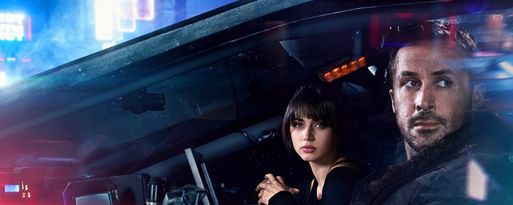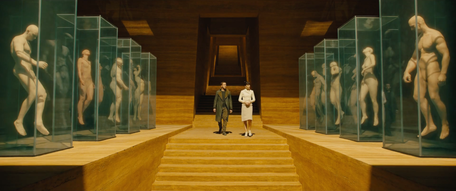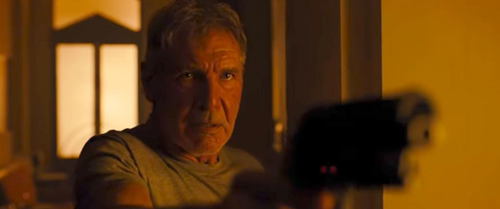B+ | A cop on the hunt for renegade cyborgs unearths a conspiracy. Directed by Denis Villeneuve Starring Ryan Gosling, Harrison Ford, and Robin Wright Review by Phil Crone |

SHOULD YOU SEE THE ORIGINAL? – Probably, but it isn’t required viewing. A few pieces of the aesthetic might be lost in translation, but you really don’t need much beyond a basic understanding of who Deckard is, who Rachel is, and their relationship. Everything else can be gleaned from context within the movie.
SPOILER-FREE, SHOULD I SEE THIS? – More than likely yes. The pacing is a bit deliberate by today’s standards, but if you like Denis Villeneuve’s previous outings Sicario and especially Arrival, or you’re a fan of the original, you should see this. And try to see it on IMAX or Cinemark xD or something like that, because this is a visual spectacle.
Ok, and with that, onto the show…
At the center of Blade Runner 2049 is K, an LAPD Blade Runner and replicant himself. We see the opening confrontation with Sapper Morton, a replicant who has been on the run for close to 30 years and living a relatively peaceful life. K ultimately does his job, but not before Sapper declares that K is who he is because he “hasn’t seen a miracle yet.” This is a great introduction to who K is. He’s an unquestioning loyal soldier, and that’s just how the LAPD wants him given the “baseline” tests he undergoes in a post-trauma setting. We don’t receive much detail about who K is, but we can safely infer that he was created for the sole purpose to be a Blade Runner, and like Roy Batty and his gang of replicants, seems to be without empathy. Society sees K for what he “is” as well, branding him as a traitor to his own kind and calling him a “skinner.”
The sequence where K heads home gives us one of our initial looks at LA in 2049. We see more and more of LA throughout the film, and my biggest takeaway was how it looked like the logical progression of how the city would have aged from the 30 years prior we saw in the original 1982 movie. It was very similar to 2015’s “Star Wars: The Force Awakens” in that the design was not based on how our universe has changed over the last 30 years, but rather how you would expect THAT universe to progress over the ensuing 30 years. The wall of CRT’s as K eats a meal is right there, and the same company advertisements – even Atari and Pan Am – flash across the LA skyline. Little details like that are critical to immersion into a world like this, and Blade Runner 2049 does an excellent job honoring its past.
It’s this first walk home and his initial encounters with Lieutenant Joshi that give the audience a sense that K understands who he is with grim perception. I enjoyed the few interactions we get with K and Joshi, who discuss things like K’s “childhood memory” of hiding a small horse, a memory he knows is artificial given that implanting replicants with real memories is illegal. Joshi gets one of the many great quotes of the movie in when K and Joshi discussing the nature of humanity and the need to be born to have a soul by stating “For not having a soul… You’re getting along fine.” It’s an interesting perception as it provides one of our first looks into how humanity views replicants in 2049: they’re happy to be doing what they’re doing, unquestioning the motives of why they do it. These conversations do set in motion the question Villeneuve looks to answer through K’s journey: what makes a being “human?”
Outside of Joshi, Villeneuve uses a number of ancillary characters to point out the hypocrisy of society’s view on what is humanity, a view best represented by new savior of humanity and now mass producer of replicants Niander Wallace. Wallace surely sees himself as human, but based on the presence of his own cybernetic implants and very unnatural method of seeing, it’s fair to ask the question what makes him more human than the newborn replicant he brutally murders (or is it just “retires?”) without hesitation as he discusses the need for quicker production and the logic of civilizations and their need of slave labor to ultimately flourish.

K is now on the case trying to find the replicant child as well, and his investigation leads him to an orphanage. He does not go alone on this assignment though, as he now brings along his once-tethered live-in AI Joi, who provides one of the most fascinating commentaries on humanity by the end of the movie. Joi is just a hologram, but she is very much sentient. She is also fully devoted to K, turning down the “opportunity” to go where she may in order to be with K. It’s a bit of a hollow offer given the receiver K carries, but it is important to note her reaction to get a gauge on her own version of humanity.
K quickly learns in the orphanage that his memory of the horse that he relayed to Joshi was a real memory, leading K to now question his very existence. Is he human after all? Were these memories “his” memories? K tracks down Dr. Ana Stelline, a “memory creator” who builds the memories implanted in replicants’ heads. She confirms the memory is real, and the result of this revelation is a very, well, human reaction from K. He is now unable to get back to “baseline” following the experience, with Joshi allowing him to flee, with his quest no longer being about who the child is, but the very nature of his own existence.
Before leaving, Joi wants to give K a present of sorts – the chance for them to interact physically. In a scene at first very reminiscent of Her, Joi brings in Mariette, a replicant prostitute K had a previous run in with. The scene that transpired here with the “merging” of Mariette and Joi was a mesmerizing feat and should alone result in a Best Visual Effects Oscar. Besides the visual wizardy, we get another look at Joi’s unwavering devotion to K as she callously tosses Mariette out once Joi is finished using her and returns to K to help him cope with everything that has transpired. Joi takes the confirmation of the memory being real as a celebratory revelation, prodding K to take on an actual name and suggesting Joe as the name, a suggestion that will almost break K by the end of his journey.
K’s journey to find his true nature leads him to whom he believes is his father: Rick Deckard himself, now living in a casino with no companionship other than a dog and a lot of explosives. I particularly enjoyed Deckard and K’s battle in the showroom, with K using the holograms as a form of cover to get the jump on Deckard. Ultimately, the two end up deciding drinking is better than fighting, with Deckard getting some whisky for the two of them plus his dog. “Is he real?” “Ask him yourself.” It’s a great exchange between Deckard and K (now calling himself Joe) that pulls again at the question of humanity. K and Deckard are having two different conversations in this moment, with K asking if the dog is “a dog” and Deckard correcting him by asking if it really matters on way or the other as long he is who (or what) he is. This distinction becomes especially important in the ensuing action, as Villeneuve is now starting to draw a line in the sand of what “humanity” is in his view.
We then have the ensuing action of Deckard being captured by Luv, who then “kills” Joi in the ensuing fray. Mariette arrives later to retrieve K to bring him to the beginnings of the replicant revolution squad, who add another “requirement” to humanity: a cause worthy of dying for. Mariette uses the phrase made famous in the original “Blade Runner” and later Rob Zombie, calling themselves “more human than human.” It is then revealed that K is in fact not the child of Deckard and Rachel, as he instead comes to the realization it is Dr. Stelline. This reveal was reminiscent of the reveal in Arrival – it was staring you in the face the whole time, if you just bothered looking. We see in “K’s” memory that he has hair when he hides the horse. As was made clear by the visit to the orphanage and the memory, all the boys were shaved, so it clearly couldn’t be a boy who hid the horse. It begs the question of what Stelline’s motives were. Did she want to be found, implanting this memory in several Blade Runners until they finally made the connection? It’s difficult to say, and we don’t get any clear resolution of this nagging question.
As K walks the bridge broken, his encounter with the holographic Joi advertisement gives an impressive revelation. She also refers to him as “Joe,” and it clicks for K – Joi was programmed to be that way, without any remnant of true free will. This is open to interpretation, but to me, this is the final piece of the humanity puzzle: free will. This is what made Roy and his gang “human” by the end of the original “Blade Runner” – they revolted, embracing the humanity of questioning your existence. Until the possibility of being homo sapien was presented to K, he never questioned this – it’s fair to ask if he was “human” until that revelation. Was Joi “real?” Absolutely. Was Joi “human?” Absolutely not. Villeneuve is drawing the line in the sand that being sentient and capable of higher processing is not what being human means – it’s the messy randomness of us that make us “human.” Joi provided companionship and unquestioning loyalty, but that was it. Her sole “motivation” was to make K feel good, hence why she didn’t take the opportunity for freedom once given it. Deckard had his dog, and K had Joi.

After all this, we get our final showdown between Luv and K as K stages an ill-advised rescue of Deckard. It’s a solid scene overall that results in K rescuing Deckard, but not without being mortally wounded. It’s worth noting that Luv remains stoutly loyal to the end, despite her reservations. Of course, this begs the question: is Luv “human?” I think the answer depends on how you felt about K at the start. Luv is ultimately a sympathetic figure: like all replicants, she was born into a life she never wanted. Unlike K, she never found a mission to believe in that was “worth dying for,” and ultimately fell in the line of duty, living and dying as nothing more than Wallace’s slave.
Despite the warnings of the revolution, K returns Deckard to his daughter. Like Freysa said, to find a cause like this is to be “more human than human.” K’s final action is ill-advised, rash, selfless to him yet selfish to his journey, and ultimately costs him his life. K’s final action, in other words, is distinctly human.
Blade Runner 2049 is another filmmaking achievement by Denis Villeneuve and is worthy of all the accolades it’s sure to receive. I’m sure there are some things I missed above (like the bees). The central narrative on the nature of humanity wrapped in an incredible world may only be recognized in the end for its technical achievements, but we would be remiss not to recognize the insights into our very being and K’s journey to becoming “more human than human."
Grade: A+
 RSS Feed
RSS Feed